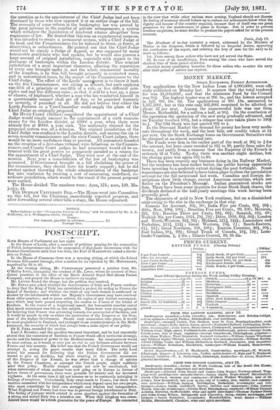POSTSCRIPT.
Bars Houses of Parliament sat last night. In the House of Lords, after a number of petitions praying for the restoration of Polish independence and for the suspension of diplomatic intercourse with the Russian Government until that was done, the Earl of hannownv raised a discus- sion on Poland.
In the House of. Commons there was a morning sifting, at which the Inland Revenue Bill passed through, after a motion for its rejection by Mr. HENNEssItY, negatived by 82 to 49. At the evening sitting, Mr. CONINGITAM presented a petition from Mr. O'Malley Irwin, impugning the conduct of Mr. Lever, whom he accused of frau- dulent practices in the affair of the North Atlantic Royal Mail Steam Packet Company, and prayed the House to institute an inquiry.
Mr. LEVER denied the charge, but the petition was received.
Mr. IIINGLAlln asked whether the Governments of Italy and France continue to deny that the King of Italy has entertained a project for ceding to France the Island of Sardinia; and whether the truth of any such denials is confirmed or Sbaken by the information whieh her Majesty's Government; may have reeeived from other quarters; and to move address for copies of any further correspond- mice which may have passed respecting the cession to France of the Island of Sardinia. In the course of a lengthened speech the honourable member stated that much uneasiness was felt on this subject. There were very strong grounds for believing that France was advancing towards the annexation of Sardinia, and it would be unsafe to rely on either the moderation of the Emperor or the firm- ness of -the Italian Government. Should such annexation take place, it would be mosf prejudicial to England, and endanger those communications in the Medi- terranean, the security of which had always been a main object of our policy.
Sir R. PEEL seconded the motion.
Lord J. RUSSELL said the question was most important, and he had repeatedly' stated that the connexion of Sardinia-to France would affect territorial arrange- ments and the balance of power in the Mediterranean. Its consequences would be most serious, as it would at once Imt an end to any intimate alliance between- France and this country. His belief was that the French Government would not attempt it seeing the grave results that mast follow: The noble Lord stated his reasons for believing that the Italian Government' did not intend to give lap Sardinia, but while trusting in the pacIfiC assurances .of the Emperor of the' French, he was steam that a change of opinion] in the French Chambers, or amongst the. French people, might suddenly .alter that policy. Hostile designs might not now be entertained but when movements of whole nations were now going on in Europe in favour of better forms of government, there were grounds for anxiety. and for increased vigilance. At the same time it did not become us to be constantly indulging irf feelings of suspicion. Undoubtedly Italy owed much to France, but there were matters connected with her independence which must depend upon her own people, who must consolidate by their own strength and wisdom real independence. What England and France had done was to prevent: foreigninterference in Italy. The feeling of jealousy which existed in some quarters against the formation of a strong and tinned Italy was a mistaken one. When that kingdom was conso- lidated there would he a fresh guarantee for the peace of Europe. He concurred i in the view that while other nations were arming, England should not disarm. No feeling of economy should induce us to reduce our armaments below what the dignity and honour of the country required, because that of itself was one great guarantee for the maintenance of peace in Europe. But in order to prevent needless sn.spioion he must decline to produce the papers asked for at the present moment.






























 Previous page
Previous page